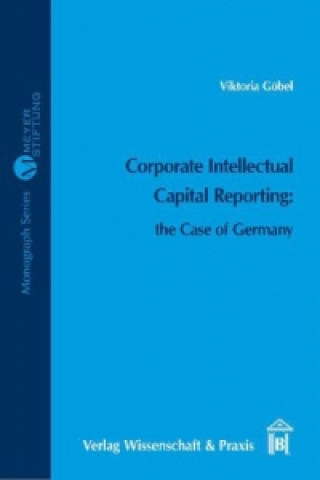
Code: 05327824
Corporate Intellectual Capital Reporting: the Case of Germany
by Viktoria Göbel
Intellectual capital (IC) consists of intangible resources and is considered to equip a company with competitive advantages, encompassing efficient internal structures, beneficial relations to primary stakeholders and employee com ... more
- Language:
 English
English - Binding: Paperback
- Number of pages: 282
Publisher: Wissenschaft & Praxis, 2014
- More about this

53.86 €
RRP: 53.86 €
You save 0.01 €
Availability:
50/50 We think title might be available. Upon your order we will do our best to get it within 6 weeks.
We think title might be available. Upon your order we will do our best to get it within 6 weeks.We search the world
You might also like
-

Tiger: Schwere Panzerabteilung 502
32.76 € -23 % -

Timely Meditations
61.54 € -

Web Survey Methodology
74.24 € -

Valuation
31.63 € -

Ruth Benedict
77.10 € -

Who Can Stop the Drums?
150.63 € -

Simultaneous Localization And Mapping: Exactly Sparse Information Filters
126.36 €
Give this book as a present today
- Order book and choose Gift Order.
- We will send you book gift voucher at once. You can give it out to anyone.
- Book will be send to donee, nothing more to care about.
Availability alert
Enter your e-mail address and once book will be available,
we will send you a message. It's that simple.
More about Corporate Intellectual Capital Reporting: the Case of Germany
You get 133 loyalty points
 Book synopsis
Book synopsis
Intellectual capital (IC) consists of intangible resources and is considered to equip a company with competitive advantages, encompassing efficient internal structures, beneficial relations to primary stakeholders and employee competencies. IC has been argued to considerably contribute to corporate value creation. As IC reporting represents a central communication platform for this important form of capital, a separate area of research has developed on IC reporting.This study examines potential motivations for IC reporting in management reports of 428 listed German companies for the accounting year 2010. Germany offers a unique research setting for IC reporting due to a mandatory Management report containing information on IC. To infer motivations, agency theory and legitimacy theory are applied to test which theory better explains IC reporting. According to agency theory, companies report on their IC to reduce the Information gap between managers and owners, interpreted in this study as explaining the value creation process for IC. In contrast, legitimacy theory suggests that corporate IC reporting serves as a tool to legitimise the company s market position, which is investigated by looking at corporate mispricing and the proportion of intangible resources. The study is structured in three research projects. The first two projects analyse methodological approaches, providing the Basis for testing theories in project three. In the first project, a novel measure to estimate IC value is identified in the area of mergers and acquisitions research and innovatively applied to IC research. The second project supports a parsimonious design of a research framework for an IC content analysis. In the final project, the results show that legitimacy theory better explains IC reporting compared to agency theory. According to the findings, IC reporting is motivated to legitimise a company s market position and to justify the use of intangible resources.
 Book details
Book details
53.86 €
- Full title: Corporate Intellectual Capital Reporting: the Case of Germany
- Author: Viktoria Göbel
- Language:
 English
English - Binding: Paperback
- Number of pages: 282
- EAN: 9783896736772
- ISBN: 3896736779
- ID: 05327824
- Publisher: Wissenschaft & Praxis
- Weight: 462 g
- Dimensions: 211 × 147 × 16 mm
- Published: 2014
Trending among others
-

Dune
13.10 € -

Haunting Adeline
30.81 € -

Berserk Deluxe Volume 2
52.63 € -

White Nights
3.57 € -24 % -

Powerless
12.48 € -4 % -

Atomic Habits
15.97 € -15 % -

Dune Messiah
9 € -20 % -

Berserk Deluxe Volume 3
52.83 € -

One Day
12.59 € -13 % -

Berserk Deluxe Volume 1
44.43 € -13 % -

Iron Flame
16.27 € -19 % -

Surrounded by Idiots
10.13 € -16 % -

Harry Potter and the Prisoner of Azkaban (Minalima Edition)
27.84 € -32 % -

Gravity Falls Journal 3
22.01 € -

Heaven Official's Blessing: Tian Guan Ci Fu (Novel) Vol. 1
22.01 € -

The Creative Act
24.06 € -

Dune
9.72 € -19 % -

Hunting Adeline
31.84 € -

A Little Life
17.50 € -

Children of Dune
8.80 € -22 % -

Heaven Official's Blessing: Tian Guan Ci Fu (Novel) Vol. 2
25.28 € -

Bungo Stray Dogs, Vol. 8 (light novel)
16.07 € -1 % -

Percy Jackson and the Olympians 5 Book Paperback Boxed Set
47.81 € -

Solo Leveling, Vol. 1
21.50 € -

The Prisoner's Throne
10.64 € -21 % -

Court of Thorns and Roses
9.31 € -22 % -

Cry Baby Coloring Book
10.85 € -4 % -

Fourth Wing
16.68 € -16 % -

Icebreaker
9.41 € -16 % -

Berserk Deluxe Volume 6
47.81 € -6 % -

Avatar, the Last Airbender: The Kyoshi Novels (Box Set)
27.54 € -33 % -

The 48 Laws of Power
26.92 € -1 % -

House of Leaves
23.24 € -4 % -

Twisted Lies
9.72 € -19 % -

Dune Messiah
12.69 € -12 % -

No Longer Human
16.99 € -

48 Laws Of Power
22.62 € -5 % -

Twisted Games
9.41 € -22 % -

Caraval Paperback Boxed Set
39.83 € -8 % -

Solo Leveling, Vol. 2
22.42 € -

Open Circuits
34.40 € -16 % -

Berserk Deluxe Volume 5
51.30 € -

Heaven Official's Blessing: Tian Guan Ci Fu (Novel) Vol. 3
16.78 € -19 % -

Berserk Deluxe Volume 4
46.59 € -9 % -

Court of Mist and Fury
9.31 € -20 % -

SOLO LEVELING V08
22.42 € -

English File Upper Intermediate Multipack A (4th)
22.21 € -

CHAINSAW MAN V14
11.25 € -14 % -

Before the Coffee Gets Cold
10.44 € -20 %
Osobný odber Bratislava a 2642 dalších
Copyright ©2008-24 najlacnejsie-knihy.sk Všetky práva vyhradenéSúkromieCookies


 21 miliónov titulov
21 miliónov titulov Vrátenie do mesiaca
Vrátenie do mesiaca 02/210 210 99 (8-15.30h)
02/210 210 99 (8-15.30h)